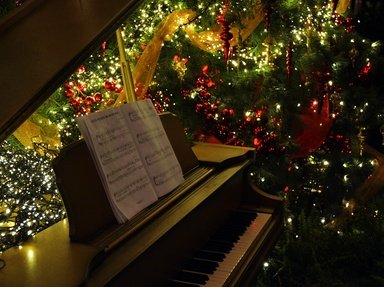Quiz Answer Key and Fun Facts
1. This joyful carol, announcing the arrival of our Lord and sung to the tune "Antioch" is believed to have been written for the Methodists, but is probably much earlier. The words are by Isaac Watts who claimed they express "the first and chief Sense of the Holy Scriptures" What is it?
2. This fifteenth century carol was once used as a processional, as can be seen from its slow, reverent beat, suitable for a march at the start of a service. It has a cry to Jesus in each of the names by which he is known. What is it?
3. Harps of gold, cloven skies, and the prophesy of peace on earth when "all the world (shall) give back the song which now the angels sing." feature in the well loved American carol. Can you name it?
4. Which tune shall we have? This carol is the organist's dilemma. There are at least three familiar and well loved tunes for it. It describes the place where Jesus was born. The third verse is the quietest and begins "How silently, how silently the wondrous gift is given." How does it begin?
5. This very well known carol is called Luther's carol, but is probably American, and taken from a Lutheran book for children dated 1885. It is a children's favourite. Can you name it?
6. This is a carol about which much folk lore has accumulated. There are so many versions of the words that quoting them as a clue would be no help at all. In folk lore it is associated with guitars and organs and mice. Do you know which beloved, quiet carol this is?
7. "On Christmas night, all Christians sing, To hear the news the angels bring."
This is the start of a carol where the words are inextricably connected to a folk tune from a county on the south coast of England. Do you know which county has given its name to this carol?
8. This carol tells the story of the angels visiting the shepherds, almost word for word from St Luke's gospel. Which carol must it be?
9. This is a good rousing carol for starting a Carol service. If anyone felt inclined to drowsiness before it began, all thought of sleep would be driven out of their minds by the tune "Yorkshire, Stockport". Are you awake enough to name it?
10. This is a good choice for the last carol of a Christmas Service. It is a Flemish or French melody and the words request the angels, shepherds, sages and saints before the altar bending, to proclaim Messiah's birth. It has a refrain that sounds like bells.
Source: Author
Toeknee448
This quiz was reviewed by FunTrivia editor
agony before going online.
Any errors found in FunTrivia content are routinely corrected through our feedback system.

